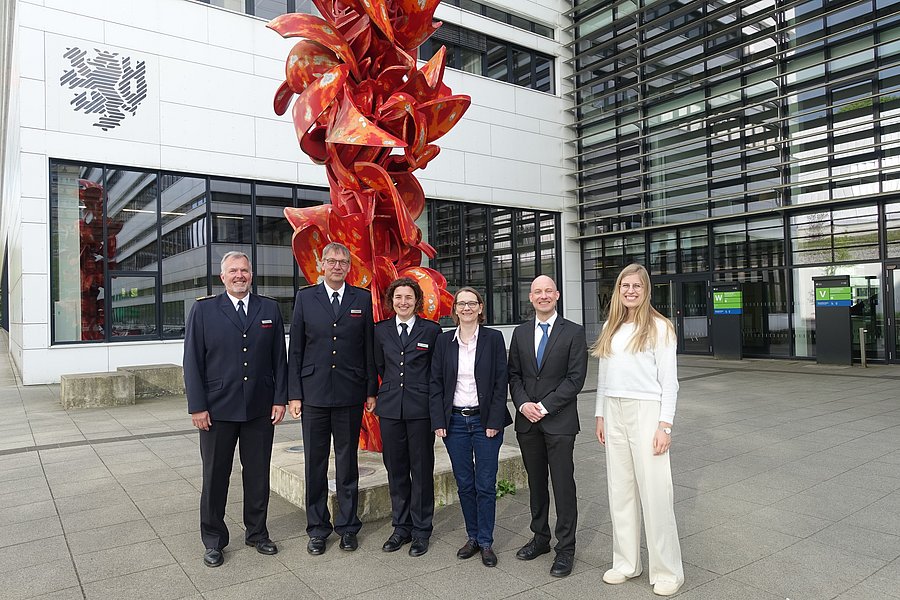Co-operation
AI, VR and co.: New research project investigates innovative technologies for use by the fire service

The project team after signing the contract: (from left) Dr Hauke Speth (IdF NRW), Berthold Penkert (IdF NRW), Sarah Weber (IdF NRW); University Chancellor Dr Ursula Löffler (BUW), Prof Dr Meinald Thielsch (BUW) and Dr Mira von der Linde (BUW) // Photo Maike Ramrath
The security situation has changed significantly in recent years - in Germany and worldwide. Climate change, migration, extremism and violence are increasingly challenging the security authorities. Emergency services such as the fire service have to act in very dynamic operational situations and often under great time pressure.
In particular, the significantly greater digitalisation and networking of systems harbours unprecedented risks. At the same time, the technical possibilities for supporting command and emergency services in dealing with these increasingly complex, multifaceted tasks are increasing.
Completely new requirements
However, the use of AI-supported systems, robots and augmented reality (AR) as well as autonomous systems places completely new demands on those involved. The IT-Fw project is therefore focussing on three main topics. Firstly, the general analysis of innovative technologies and their use in training and practice, particularly in the fire service. In addition, the specific requirements for training and strategic work for senior civil servants in the higher fire service are being researched.
The "FIRE Feedback Survey Panel" is used for this purpose, with which emergency services can be surveyed on specific topics, and ongoing studies in the intersection of psychology and civil security are also carried out there. "Together with the NRW Fire Service Institute, we can gain completely new insights for science and practice - and thus contribute to safety in our country. In this cooperation, it is particularly true that the whole is much greater than the sum of its parts," says a delighted Prof Thielsch.
Joint research experience
The collaboration is based on ten years of joint research experience. Before moving to Wuppertal, Meinald Thielsch (formerly of the University of Münster) and the IdF NRW had already co-operated successfully on several projects. The results to date reflect the close links between science and practice: together, the two partners investigated leadership, teamwork and health in the fire service and effectively developed these topics further.
Those responsible emphasise that this cooperation shows how fruitful collaboration between science and the fire service can be: At the centre is an effective symbiosis of both practical and psychological issues and scientifically sound findings - for the benefit of the fire service and the safety of the public. In addition to publications in renowned scientific journals, practical articles are regularly published in specialist journals - for example on topics such as the motivation of volunteers or the necessary skills of managers.
"Which AI systems, virtual reality applications, robots and other technical support are suitable - also thinking strategically into the future - for meaningful support of the fire service in its diverse field of activity?" asks Berthold Penkert, Director of IdF NRW. At present, the fire service is often still very much characterised by manual work. "That's a good thing and will largely remain so, but perhaps the latest technology can help in some areas of training and operations, and we definitely need to consider the 'human factor'."
The project partners
The NRW Fire Service Institute (IdF NRW) is the largest fire service training centre in Germany. The IdF NRW offers various basic and advanced training courses for professional and voluntary members of the public and company fire services in NRW and coordinates the nationwide training of members of the higher fire service (career group 2, 2nd entry level). In addition, the IdF NRW qualifies specialised personnel in a wide range of areas. Another task of the IdF NRW is to train and educate members of crisis teams. Every year, the IdF NRW trains over 18,000 participants. Comprehensive training areas at several locations allow the systematic simulation of a wide range of operational situations. Innovative solutions can also be analysed here and the latest technologies tested in an application-oriented manner.
Occupational and Environmental Psychology at the University of Wuppertal (AUW), headed by Prof. Dr Meinald Thielsch, uniquely combines many years of experience in civil security research with a high level of expertise in occupational, organisational and engineering psychology as well as online panel research. At the University of Wuppertal, this fits in particularly well with a lively interdisciplinary field of security research in teaching and research. The PsyWeb population panel, which currently has over 20,000 participants and aims to involve as many people as possible in psychological studies, also offers unique opportunities to conduct a wide variety of studies both cross-sectionally and longitudinally over time and to compare the results of expert studies with the perspective of laypersons or affected citizens.
Further links
FIRE Toolbox: https://aupsy.uni-wuppertal.de/de/instrumente/fire-toolbox/
Chair of Occupational and Environmental Psychology (BUW): https://aupsy.uni-wuppertal.de/de/
Institute of the NRW Fire Service (IdF NRW): https://www.idf.nrw.de
FIRE Feedback survey panel: https://fire.uni-muenster.de
